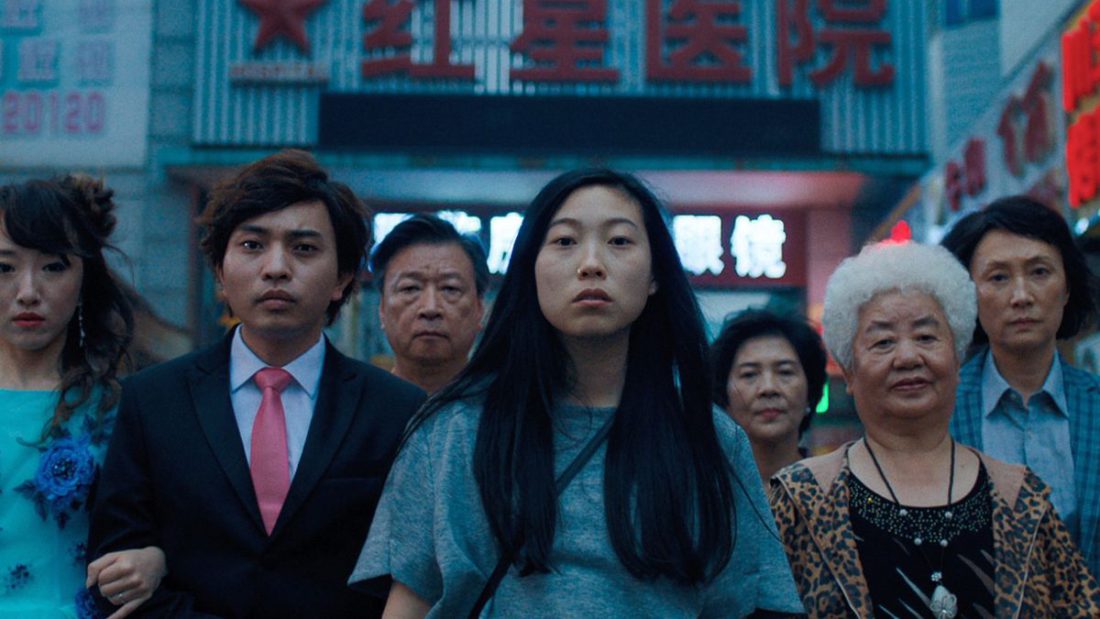“Based on an actual lie.”
These are the first words we read on screen in Lulu Wang’s remarkable sophomore feature film, The Farewell — words that echo throughout its taut 100 minutes. It’s a tongue-in-cheek introduction, a bit of comic relief mixed with a caveat: What we’re about to witness is a depiction of a murky truth, and we mustn’t forget it.
The action then shifts to an international phone call between New York City-based Billi and her grandmother, whom she calls Nai Nai, who’s in a hospital waiting room in China. Portrayed with impressive depth by actress/rapper Awkwafina (Crazy Rich Asians), Billi is a 30-something first-generation Chinese American writer who’s idealistic, restless and a little bit lost. The exchange with her grandmother is one we’ve all more or less had with our own family members, one filled with little white lies and half-truths — the kind of polite conversation you make in order to maintain familial equilibrium. There’s a lot of love there, but there’s also a palpable sense of restraint.
A few scenes after this chat, Billi’s parents drop a revelation that rocks her to her core: Nai Nai has been diagnosed with stage 4 lung cancer and only has a few months left to live. The twist is that Nai Nai is completely unaware of her diagnosis. As is customary in China, the bad news is given to a family member — in this case, Nai Nai’s younger sister (played by Hong Lu, Wang’s actual great-aunt) — instead of the patient for fear that the news will be too much to bear and worsen the little time she has left.
Needing an excuse to say their clandestine goodbyes, the family decides to move up a grandson’s wedding date, compelling everyone to come back to Changchun for one last celebratory hurrah. Billi understandably balks at the deception, questioning the intense ethical dilemma her family has put her in: Should she abide by their wishes or reveal her grandmother’s truth? She sympathetically struggles with the moral implications of taking away Nai Nai’s right to a proper goodbye against her cultural ethos of compassion by omission.
While Billi and her father, Haiyan, played with exquisite tenderness by Tzi Ma (Arrival), tearfully grapple with this predicament, her mother, Jian (Diana Lin), sharply decides that it wouldn’t be wise for Billi to attend the wedding, claiming she’s too sensitive, too outwardly emotional and, in essence, too American in her transparency. An admirably composed woman who has no time for open displays of emotion, Jian worries her daughter won’t be able to conceal her feelings from her grandmother — a trait she regards as indulgent and selfish.
The film’s dichotomy of cultural attitudes mirrors larger themes at play — the divide between West and East, the difference between immigrant and native, and the nuances of being Chinese and Chinese American. These are all stark, ever-present conflicts within Billi’s identity as she’s tasked with reconciling her traditionally reserved, native-born cultural norms with her adopted attitudes of emotional honesty. Her Chinese family is deeply concerned with the impact of the mind-body connection, while her American upbringing is brimming with feelings of extreme guilt and grief.
At the center of it all, Zhao Shuzhen shines as Nai Nai, the family’s tiny, vivacious white-haired matriarch. She exudes an infectious cheerfulness and comical honesty that leaves us no choice but to lighten up amid the somber circumstances. Her character provides much of the necessary comic relief and brightly illustrates the intersection of drama and comedy.
Under Wang’s impeccable guidance, humor arises from moments of extreme duress, such as when Nai Nai spars with a caterer over the promise of lobster, not crab, at her grandson’s wedding. The tonal balance between grief and comic relief is particularly poignant during the film’s multiple dinner table scenes, where woe is quietly tempered by Nai Nai’s colorful commentary and insistence on more meat pies for everyone.
In tandem with these accomplishments is Alex Weston’s score, which mournfully haunts the characters as they try to navigate through the dubious web they’ve created. With the central theme “The Lie,” Weston and Wang create a Greek chorus of sorts, a warning to viewers that the burden of the lie and the truth about Nai Nai weighs heavy on their hearts. This shadowy, melancholy music envelops the screen in such a way that we can feel the family’s guilt and are right there wading in it with them. These sounds, coupled with the gorgeously gloomy visuals from cinematographer Anna Franquesa Solano, manage to clearly express what our characters cannot: deep, nearly insurmountable waves of bittersweetness.
It’s those special moments of silent heartache at mealtime, cringe-worthy wedding karaoke and comically cathartic tai chi in the alleyway that exemplify the true ebb and flow of family, identity and life. These affecting choices make Awkwafina and Wang artists to watch and make this indie film worthy of its critical applause.
The Farewell is a story about love, loss and the little moments of life we find in between. It’s a story worth being told — all the way through the must-see credits — and we are all lucky to partake in it.
Starts Aug. 1 at the Fine Arts Theatre



The short take – it’s the best film so far this year, every scene is exquisite – thoughtful or sad or silly and always about the importance of family, whether you’re lying or telling the truth. And oh, mercy, those many food scenes – get me to an all-you can-eat Chinese restaurant immediately afterwards!